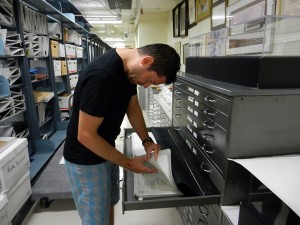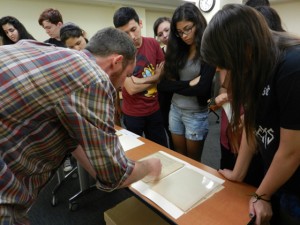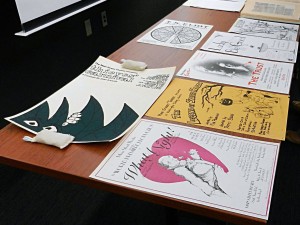
Today we have a goodbye post from Bryan Bishop ’14, the department’s first Instruction Support Student Worker. During his year in the position, he prepared rare materials for class visits, maintained the Evans Room (our classroom and function space), input student learning assessment data, digitized materials requested by patrons, and created descriptive metadata for a collection of World War II photographs.
A graduate of the UH Honors College in History and Political Science, Bryan is heading to Fonville Middle School in H.I.S.D. to teach U.S. History for the 2014-15 school year. He has also been accepted into the John W. Draper Master’s Program in Humanities and Social Thought at NYU with a deferred start date. All of us will miss Bryan’s intellectual curiousity, “can do” attitude, and sense of humor. Heeeeeere’s Bryan!
When I happened upon the Instruction Support position available in Special Collections last August, I had no idea what “instruction support” was, or that it would be the best job I ever had. As an older student worker I had had a few jobs prior to arriving at UH. But those jobs levied tremendous pressure, rarely yielding pleasure. This job was different. All that would be asked of me was to show up ready to work, complete thoroughly what was asked of me, and display passion for my projects, most of which involved research relating to my studies and interests: humanities and social sciences. Strange as it may sound, in 20 years of working this was the first time I was unconditionally happy.
Performing tasks around the department was a riot. True, I too have never associated riots with libraries. If anything, life surrounding a library is the complete opposite, serene. So how was working in Special Collections a riot? It was a riot in the sense of how I felt while and after performing my duties; that everything I did was significant for our university community and a team I hold in the highest regard—my co-workers, my friends. This, admittedly, is a peculiar illustration; however, I find that the more idiosyncratic a description is, the more unique, and in this case, special, the experience was.
I could utilize more space than the Interwebs have allotted to express my gratitude vis-à-vis the projects on which I was allowed to work. Ergo, I must devote my closing thoughts to my peers and managers in the department.
Okay, done.
Some high school students spend their summer vacations soaking up the sun or playing computer games. But Houston-area students enrolled in the Wonderworks academic enrichment program spend five weeks of their summer intensively studying art, architecture, film, or literature. In early July, Wonderworks students in a class called Story Lines visited Special Collections to get up close and personal with one of author Larry McMurtry’s manuscripts.
The students had already read McMurtry’s novel The Last Picture Show, a coming-of-age story set in a small Texas town, and viewed the classic film of the same name. But their instructors Zachary Martin and Daniel Wallace, PhD students in the Creative Writing Program at the University of Houston, also wanted them to see first-hand the process McMurtry used in shaping his novel.
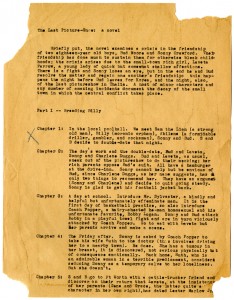
Larry McMurtry’s typed notes and outline for The Last Picture Show (from the Larry McMurtry Papers)
Students examined the original typewritten first draft, noting McMurtry’s handwritten word changes and replacements of characters’ names. (Would the beautiful Jaycee have been as alluring if she were still named Lavetta?) Martin led the class through a typed outline of the plot points McMurtry originally intended his story to follow, encouraging them to identify which ones stayed in the novel and which ones were discarded by the author.
Martin used McMurtry’s draft as a springboard to talk to the students about their own writing, and the necessity of building up their prose and ruthlessly editing it into something stronger. Perhaps viewing the original words of one Houston-related writer has inspired the next generation of Houston writers.
To be inspired yourself, please visit the Special Collections reading room Our summer hours are Monday – Friday, 9:00 a.m. to 5:00 p.m.
The offices at the University of Houston Special Collections are a little quieter than usual today as some of our faculty are on the road, attending the Society of Southwest Archivists annual conference being held in New Orleans, Louisiana. The SSA, a professional organization serving hundreds of archivists, librarians, preservationists and the like, has met annually in one of the six member states since the early 1970s to build relationships among the various organizations and institutions committed to documenting our history, establish standards and principles to help guide processes, and provide education and training to its members.
As the conference has grown to encompass more days, more sessions, and more pre-conference workshops, the meat of the meeting remains today and tomorrow. With an overarching theme of “Casting a Wide Net: Broadening the Archival Experience,” panelists will present sessions covering topics like creative strategies to connect archives to underserved populations, ways to better facilitate the undergraduate experience in special collections, as well as boot camps for archivists to help with some of the other day-to-day challenges they face.
Our own Stacey Lavender, Houston Arts and History Archives Fellow, will lead a session with two other colleagues entitled, “Archival Adaptation: Responsive Approaches to Standards-Based Processing,” where she will present her paper, “Less Process, More Problems: An Adaptive Approach to Implementing MPLP.”
For those not so well-versed in the archival alphabet soup of acronyms, MPLP or “More Product, Less Process” is shorthand for an approach to the cataloging and processing challenges resulting from an increase in the acquisition of collections and sheer volume of collections in our information age, coupled with stagnant or reduced staffing levels in many archives. MPLP’s modest proposal is an attempt at “pragmatically revamping traditional processing approaches to deal with late 20th-century collections,” and, in the process, provide increased access to researchers while decreasing the number of collections in the queues of various archives. In her paper, Ms. Lavender reports on the specifics of her hands-on experience in the MPLP schema, processing collections like the Main Street Theater Records, the DJ Steve Fournier Papers, and the Carlos “DJ Styles” Garza Papers at the University of Houston.
To all the archivists in New Orleans this weekend, a tip of our hats, a hearty “thank you” for preserving our narrative, and here’s wishing you all safe passage as you head home.
The Houstonian Yearbook collection in the UH Digital Library is currently unavailable, and we apologize for any inconvenience. We are working on making this collection available again as soon as possible.
In the meantime, if you would like to take a look at the yearbooks, feel free to visit the Special Collections Reading Room during our regular hours, or contact University Archivist Mary Manning with questions about the books.
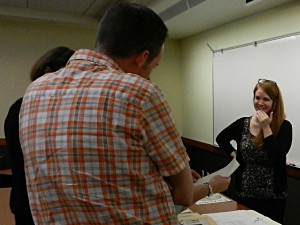
Houston Arts and History Archives Fellow, Stacey Lavender (far right), showcases items from the Main Street Theater Records at last week’s Brown Bag event
Last week Stacey Lavender, Houston Arts and History Archives Fellow for the University of Houston Special Collections, continued our Brown Bag Series by hosting the UH Libraries’ faculty and staff in an up close and personal look at the recently processed Main Street Theater Records. The Main Street Theater Records, filled with materials related to productions throughout its history, fundraising activities, and so much more, provide a telling view behind the curtain of Houston’s theater community and trace the evolution of Main Street from those heady, upstart days of the 1970s to the new century which sees Main Street and its multiple stages as an essential pillar in Houston theater.
In her presentation of the materials, Ms. Lavender highlighted the history of Main Street Theater, the role it has played in developing artistic talent, and the relatively unheralded but significant work done in the areas of education and outreach with the city’s youth. Following the presentation attendees participated in a Q&A, touching upon the challenges and rewards experienced in processing the collection, the delicate balance between access and privacy, the exciting possibilities of Main Street Theater as a living collection, and its potential for future research. Attendees were also given an opportunity to view and peruse items from the collection including production posters, newspaper clippings, photographs, and children’s fan mail addressed to Main Street, all culled by Ms. Lavender to highlight some of the treasures the collection holds.
If you are interested in getting your own up close and personal look at Main Street Theater, or perhaps any of our other Performing Arts collections, do come visit us at your earliest convenience.
